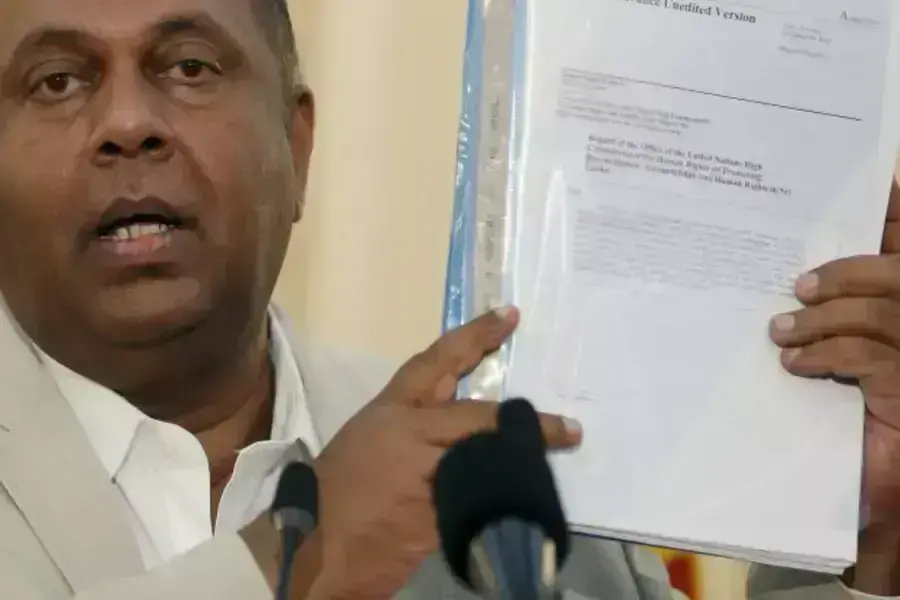This Week in Markets and Democracy: Accountability in Sri Lanka and Tunisia, Malaysia’s Cross-Border Corruption, and Democracy Day

More on:
CFR’s Civil Society, Markets, and Democracy (CSMD) Program highlights noteworthy events and articles each Friday in “This Week in Markets and Democracy.”
Sri Lanka and Tunisia Struggle with Accountability
Recent events in both Sri Lanka and Tunisia show how complicated the balance between accountability for past wrongs and political stability in new democracies can be. This week the United Nations Human Rights Council released a long-delayed report detailing the abuses committed during Sri Lanka’s brutal, twenty six-year civil war (that ended in 2009), and called for the formation of a domestic-international hybrid court to investigate alleged war crimes. The newly-elected government under Sri Lankan President Maithripala Sirisena proposes instead an independent truth and reconciliation commission—similar to the post-apartheid South African body—to investigate crimes and compensate victims. In a process already beset with political maneuvering, critics worry that without international judges, prosecutors, and lawyers’ autonomy and leverage, alleged perpetrators—including former and current government and military officials—will remain free. In Tunisia, citizens are protesting a proposed economic reconciliation law that would enable corrupt officials from the former Ben Ali regime to avoid jail if they reveal their assets and pay fines. Many fear that if enacted, it would undermine the work of the Tunisian Truth and Dignity Commission’s transitional justice efforts, and democratic progress more generally by protecting the nation’s political and economic old guard.
Malaysian Corruption Investigation Crosses Borders
The globalization of finance includes illicit transactions. An ongoing Malaysian corruption scandal has moved into the international realm, after the government hindered domestic investigations into allegations that Prime Minister Najib Razak received nearly $700 million from the failing state-owned investment fund, 1Malaysia Development Berhad (or 1MDB). The money came to his private accounts from a British Virgin Islands-registered company and via Singapore branches of Swiss banks. So far, the Swiss Attorney General’s office has frozen tens of millions in 1MDB assets, and the United Arab Emirates is following the trail of over $1 billion dollars in missing state investment funds linked to 1MDB. If Malaysian civil society, multiple foreign authorities, and private banks can successfully come together to uncover the truth, it could prove a useful model to achieve the anti-corruption goals within the United Nations’ post-2015 development agenda being finalized next week in New York.
Democracy Day: Where We Are in 2015
The United Nations’ International Day of Democracy (#DemocracyDay) celebrated the year’s advances and setbacks. The positive side counts recent citizen-led calls for government accountability. In Guatemala, citizen protests combined with sophisticated corruption investigations brought down President Otto Pérez Molina on charges of fraud, conspiracy, and bribery. In Lebanon and Iraq, citizens and civil society groups are demanding better public services and an end to corruption and political patronage.
Yet more sobering trends multiplied as well—in particular government efforts to silence those who question public officials. In Azerbaijan, lauded investigative reporter Khadija Ismayilova was sentenced to nearly a decade in jail on trumped-up charges after criticizing President Ilham Aliyev and exposing pervasive corruption. Ahead of 2016 elections, Uganda’s parliament is debating a bill that would allow the government to shutter NGOs that threaten the vaguely-defined “public interest.” Similar legislation is under consideration in China and already in effect in Cambodia, Russia, and Egypt.
Scholar Larry Diamond goes as far as calling the lack of progress a “democratic recession”—his timeline of democratic transitions petering out with the euphoria of the “Arab Spring.” Still, while regime change may have stalled, the clamor for better governance within existing democracies seems to be growing.
More on:
 Online Store
Online Store